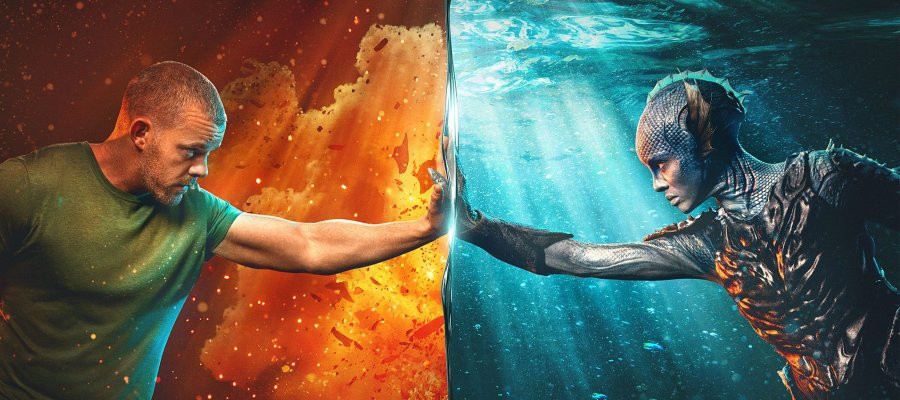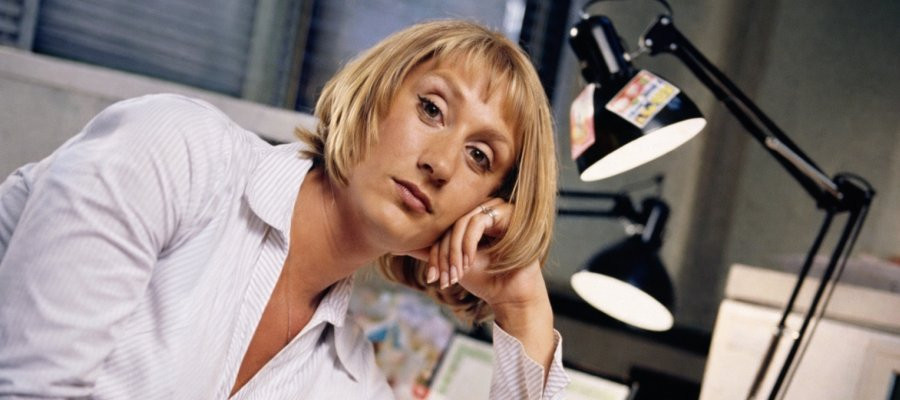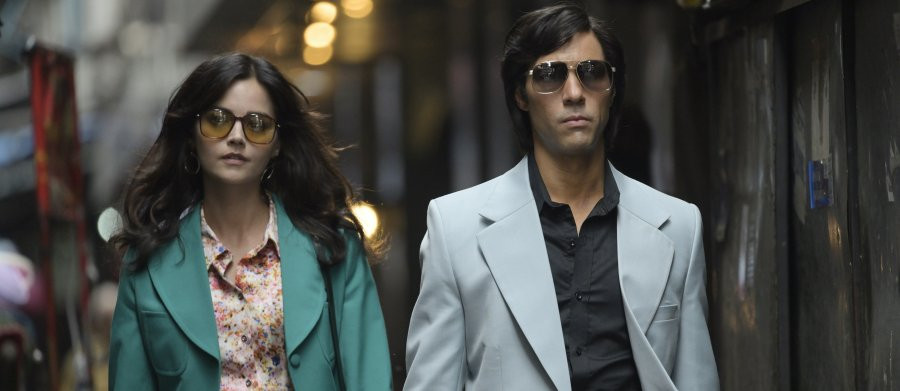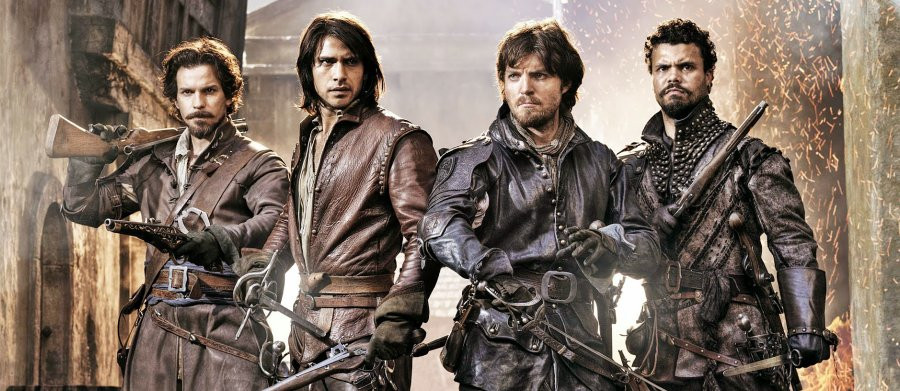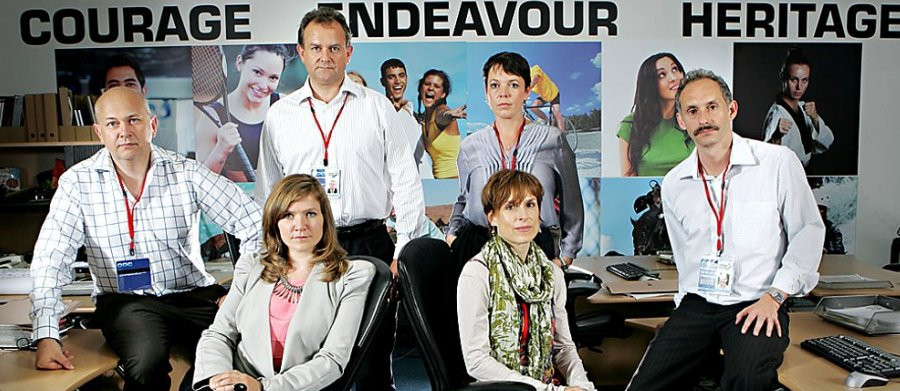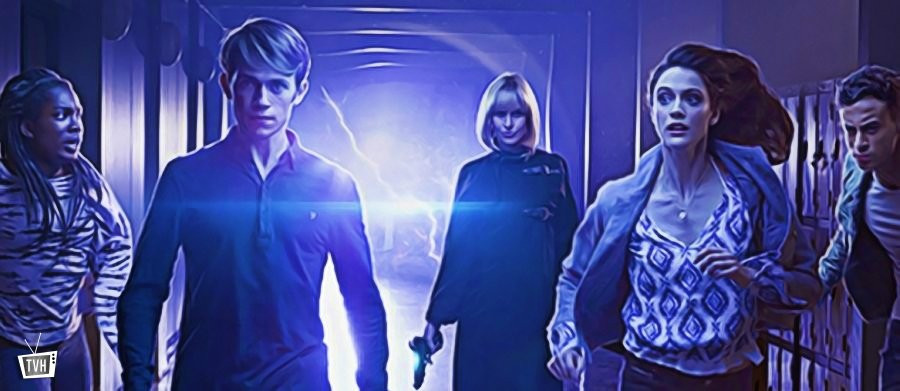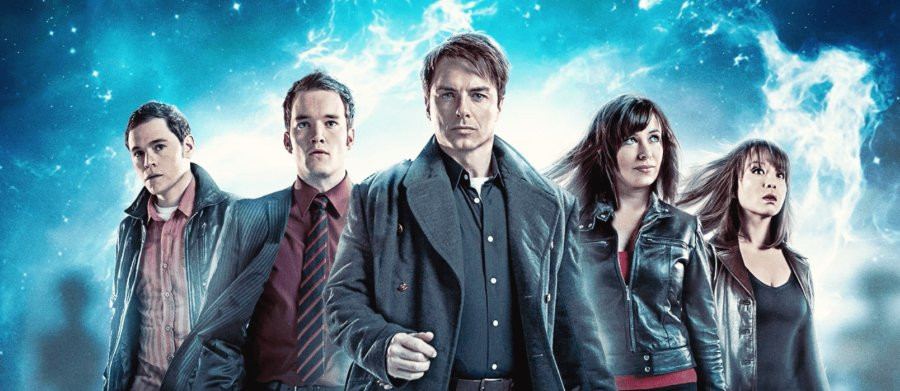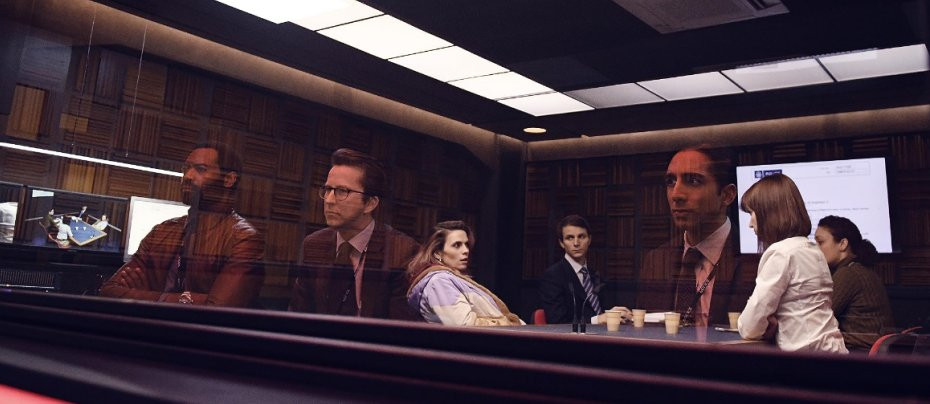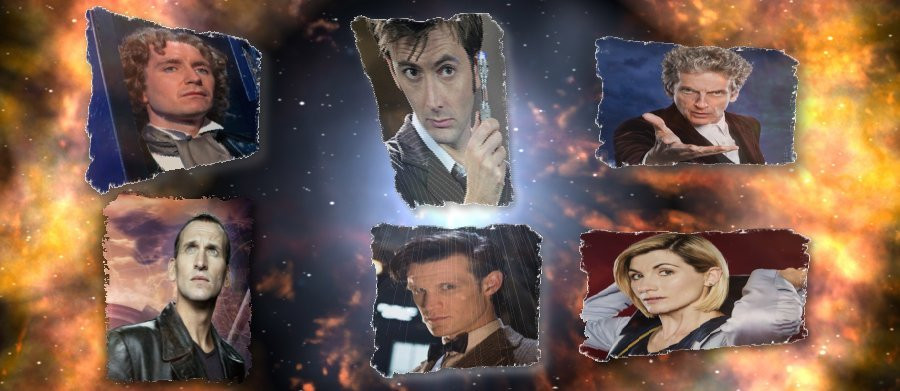
Doctor Who - New Beginnings 2
New Beginnings: Part 2 by Daniel Tessier
Doctor Who was never officially cancelled. However, 1990 came and went with no sign of a new series. As the nineties went on, parties at the BBC and elsewhere explored options for a new take on Doctor Who. In 1994, Philip Segal, a British producer working for Steven Spielberg's US company Amblin, was granted the rights to make a new series of Doctor Who. Originally conceived as a three-way production between Amblin, BBC Enterprises and Universal Television, pre-production went through various iterations with scripts by several writers. A script by Robert de Laurentis was pitched by Segal to the Fox network. This was eventually picked up by Fox's made-for-television feature division, who commissioned a new script by another Brit, Matthew Jacobs. Amblin dropped out in 1995, leaving the project between Universal and the BBC. After auditioning many actors, Paul McGann was cast as the new Doctor. Early ideas to make it a complete reboot were dropped, with Jacob wanting a continuation from the original series to ensure fan loyalty. As such, Sylvester McCoy returned to play the Seventh Doctor, who would regenerate into McGann's Eighth.
Paul McGann: Doctor Who (May 1996)
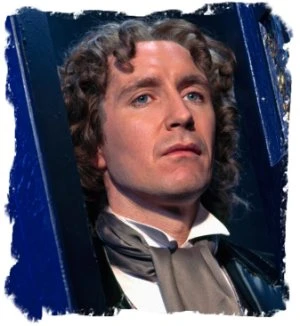
Officially known simply as Doctor Who, although referred to by fans by other titles and marketed today by the BBC as Doctor Who: The Movie, the McGann feature is an odd beast. Although made as a one-off television film, there were hopes by all involved that it would act as a “backdoor pilot” and garner enough interest for a full series to be commissioned. As it is, the movie makes for a very poor pilot, not really putting across the concept's potential. Understandably tweaked for an American audience, the film takes place in San Francisco on New Year's Eve 1999, picking up on the millennial mania of the late nineties. It is entirely earthbound, in spite of an opening monologue which begins above the Dalek planet Skaro, with McGann narrating the apparent execution of the Doctor's archnemesis the Master. It then moves onto the TARDIS, the police box spinning in space, interspersed with scenes of McCoy's Doctor within a huge and frankly gorgeous interior set, only very slowly becoming clear that the two images are related. As a fan, it's odd; as a newcomer, rather baffling.
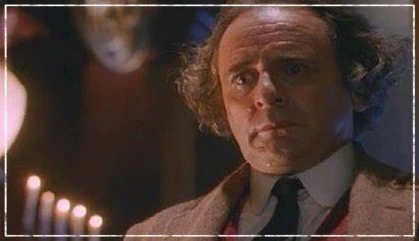
However, bafflement can be intriguing, and the move from a blue box in space to cathedral-like architecture to San Fran's Chinatown is fascinating. We are introduced to Yee Jee Tso as Chang Lee, a young gang member who is seconds from being mown down by bullets before the TARDIS materialises in front of him. The Doctor is injured in the firefight, with Lee, perhaps surprisingly, calling an ambulance for him and riding with him to hospital. Eric Roberts is introduced as a paramedic named Bruce, while a trail of slime – apparently the remains of the Master – attaches to the ambulance in pursuit.
We meet the final member of the core cast at the opera, as the beautiful and brilliant surgeon Dr. Grace Holloway – Daphne Ashbrook – is called away to attend the Doctor's surgery, much to her boyfriend's displeasure. It's beautifully directed by Geoffrey Sax, no more so than in the surgery scenes, where we as the viewer are invited to stare down at voyeuristic sponsors who stare down through an observation window at Grace operating on her mysterious patient, who's not really called John Smith. The bullets come out fine, but Grace tries to explore his erratic heartbeat, unfortunately leading to cardiac arrest and a brutal scream from the Doctor as he dies.
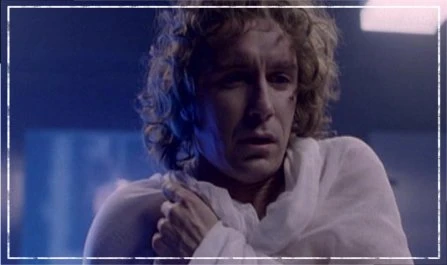
What Grace didn't know is that her patient has two hearts and unrecognisable blood, which, in a callback to Pertwee's début Spearhead from Space, is revealed in an X-ray and belated blood tests. It's perhaps a missed opportunity to have the Doctor regenerate in the morgue, rather than on the operating table, but it's a spectacular sequence, with the McCoy (gurning furiously) morphing into McGann amid sparks of lightning, then visibly returning to life. This is intercut with a morgue attendant's viewing of Frankenstein, and the Master's own unnatural rebirth, as he invades the body of the sleeping Bruce and takes his form as his own. Another effective inter-cutting is the new Doctor rifling through hospital lockers (Spearhead again, with the Pertwee era's logo another shout-out to this story) with Chang Lee going through the Doctor's belongings, which he has stolen, including the key to the TARDIS.
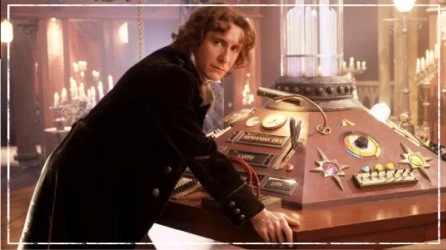
What follows is a break-neck adventure as the Doctor, who has attached himself to Grace as the one person he recognises following his brief post-regenerative amnesia, races to stop the Master and his recruit Chang Lee destroying the Earth by opening the Eye of Harmony, the black hole that powers the TARDIS. To do this they need to steal a beryllium atomic clock, although it's all a ruse for the Master to steal the Doctor's body using the power of the Eye itself. It's absolute nonsense, but entertaining nonsense, made watchable by some excellent performances. McGann is romantic and charming as a poetic new Doctor full of joie de vivre, an explicitly more human version of the character. Indeed, he is revealed to be half-human – on his mother's side – something that is essential to the plot but never spoken of again in televised Doctor Who. A great deal is made of the Doctor's Britishness. Unlike the main series, 20th or 21st century versions, which are popular in the States precisely because of their Britishness, the movie's script attempts to force stereotypical British eccentricities into an Americanised take on the programme. However, just after the Doctor accepts that he is British in the face of an American cop, he turns around the situation by grabbing the cop's gun and turning it on himself. Any American hero would have held the cop to ransom with the weapon – as indeed Grace then does – but the Doctor inverts this in a truly brilliant moment.
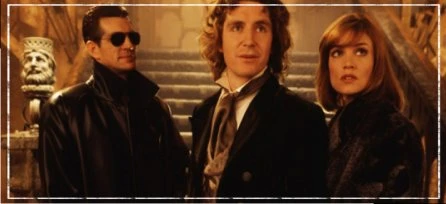
Ashbrook is magnetic as Grace, with the Doctor pairing with a woman rather than a girl for the first time in years. Much was made of the character's romance at the time, this being the first time the Doctor planted a smacker on his companion's lips, but in retrospect, it's very chaste. Indeed, while Grace is clearly besotted with the Doctor - “I finally meet the right guy and he's from another planet!” - the Doctor's initial kissing of her is more an example of this incarnation's exuberant love for everything around him. It's pales in comparison to the romances of the revived series. Roberts is just as good as the Master, a charmingly evil maniac who snakes his way through proceedings in a Terminator-like costume. It's an extremely American take on the character, but the Master's character has varied even more than the Doctor's over the years, and he still corrects people's grammar like the old school pedant he's always been. Only Yee Jee Tso falls a little flat, and he's generally fine as the wide-eyed but not terribly bright Lee.
The pace of the production disguises its shortcomings. The script really does make little sense, with technobabble and magical contrivances linking set pieces. Starting with one actor narrating events, switching to another for fifteen minutes, killing his character off and then introducing that original actor as replacement is a very strange way to go about introduce new audiences to the Doctor. There's little sense of Doctor Who as a series of adventures in space and time, with references to the Daleks, Gallifrey and sundry other elements thrown in to dialogue only to make things more confusing. It's unsurprising that the film did rather well in the UK, garnering respectable audience figures, but performing poorly in the US. With a background knowledge of what Doctor Who is, even the vague cultural background of a non-viewer, a British audience could accept this madness far easier than an American one coming in cold. The production seems unsure of whether it's a continuation or a fresh new start, a pilot or a one-off, a British programme set in the US or an American version of a British property. Without American success, a full series was never going to happen. Still, it managed to get this viewer hooked on Doctor Who, so it can't be all that alienating.
Christopher Eccleston: Rose (April 2005)
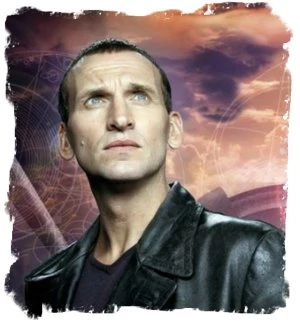
After the TV movie, it looked like Doctor Who was dead in the water, and it seemed highly unlikely that the series would ever return to television. The franchise continued healthily in other media, however, and 2003 it was announced that an animated serial was to be webcast to mark the programme's fortieth anniversary. Entitled Scream of the Shalka, this series of six shirt episodes starred Richard E. Grant as a new version of the Doctor, with Sir Derek Jacobi voicing the Master. However, the build-up to this was cut down by the subsequent announcement of a new BBC television series of Doctor Who that was just about to start pre-production, headed by the acclaimed writer Russell T. Davies (best known for Queer as Folk). Over the coming months, intense media speculation began over the cast, the style, and the difficulty in securing the rights to the Daleks. It was soon announced that Christopher Eccleston, a remarkable and hugely acclaimed actor (who had previously worked with Davies on The Second Coming) would take the role of the Doctor, while Billie Piper, best known then for her music career but a talented actor, would play his companion, Rose Tyler.
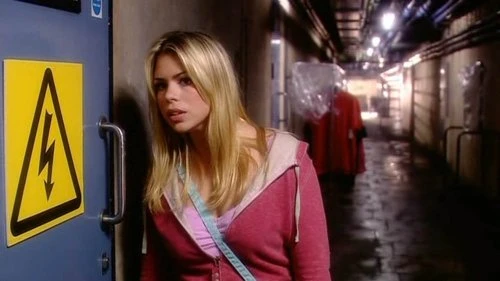
When the first episode finally arrived, it had a huge job to do. There had been no new episodes of Doctor Who on TV for over fifteen years excepting the movie and occasional charity skits. The series had become the butt of jokes and half-memories of a corny, creaky kid's show. However, with such memories comes nostalgia, and media speculation around the new series whipped up plenty of positive publicity. Nonetheless, Davies and his team still had to win over a new audience of young fans who hadn't even been born when the original run finished, in a Saturday night family viewing slot that was commonly believed to be an extinct audience.
Fortunately, Rose was an excellent relaunch. Fast paced and family friendly, there's a certain kid's TV quality to it when viewed now. Looking back, it seems a touch unsophisticated, but if anything, this simple approach made the series more accessible than it had been for decades. If the false start if the TV movie influenced Davies, it was more for lessons in what not to do. There's no regeneration to confuse or alienate the uninitiated; Eccleston arrives on the scene as a fully-formed new Doctor. (Although there is a brief moments where he catches his reflection and makes the now traditional disparaging comment about his appearance, giving a possible post-regenerative moment for those fans who yearn for such a thing.) More importantly though, the series is not introduced via the Doctor, but via Rose, a perfectly ordinary young woman who acts as a strong identification figure for the audience. Not for nothing is her name the title of the episode.
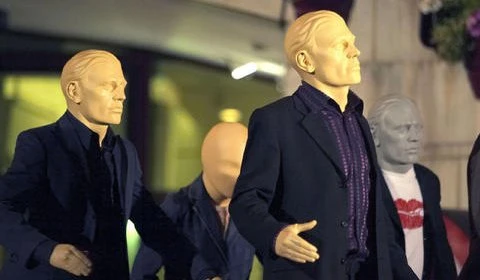
The opening of the episode is very effective, beginning with a view of the Earth from space. Much like the shot that opened Spearhead from Space, this then leads into a down-to-earth terrestrial world, but not a filmic one of military installations. No, this is an ordinary girl's life, shown to us in a burst of activity. Murray Gold, who provides music on the series until 2017, begins the episode with a punchy new arrangement of the theme tune, leading into a slightly odd bit of pacey montage music as we see snaps of Rose's life. She goes to work like normal people, working in a pretty fancy shop, and it's here that the weirdness of Doctor Who crashes into her life.
If there's one thing that both the TV movie and Rose show, it's that Spearhead from Space is an excellent model for introducing a new Doctor. As a final, and most obvious, homage, the monsters of Rose are the Autons, and the logic of having Rose work in a shop becomes apparent. The uncanny valley effect of the Autons makes them as chilling as ever, although the more expensive prosthetics available now aren't quite as creepy as the seventies ones. And then the Doctor arrives, out of nowhere, grabbing Rose by the hand and uttering a single word: “Run.” It's an amazing introduction, and from thereon the viewer, like Rose, is swept up in the Doctor's world. Eccleston is excellent in the role. Known as an intense dramatic actor, his casting is at odds with the breezier, Buffy-ish version of Doctor Who. As such, he's a huge surprise, smiling, laughing and joking throughout, a genuinely charming presence. There are, however, hints of a darker character beneath, notably in the Doctor's powerful “turning of the Earth” speech, and the first muttering of a terrible war that would form the backstory for the revived series.
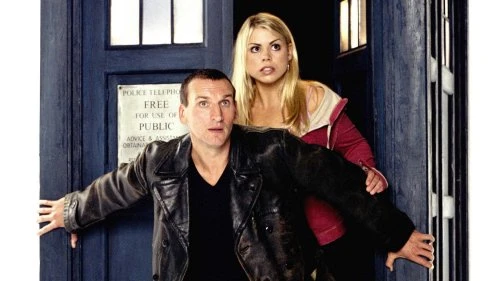
Eccleston's Doctor is, stylistically, a world away from those of the original run. After decades of frock coats, cloaks and capes, he's dressed in a battered leather jacket and dark, casual wear. There's no received pronunciation, but laid-back language delivered in Eccleston's native Salford accent, hence the classic line, “Lots of planets have a north!” Any eccentricity or flamboyance come from Eccleston's performance rather than costume, and they are considerably dialled down compared to the previous versions of the character. In fact, the only things about the Doctor that seem to have survived the revival are the sonic screwdriver and the TARDIS. The latter, still a Police Box (the incongruity of which is lampshaded), is introduced in a beautifully effective moment. Rose, chased by the Autons, follows the Doctor into his blue box in desperation, only to suddenly find herself in a gigantic alien structure, with a bold, almost organic new design. It's as effective as that very first reveal in 1963, and explains the nature of the TARDIS far better than had been attempted in years.
Rose is also brilliantly written, a believable woman who lives in a world populated by real people. She lives with her thirsty other Jackie (Camille Coduri), and her relationship with her boyfriend Mickey (Noel Clarke) has clearly entered the sort of comfortable-yet-boring stage. She doesn't immediately fall in with the Doctor, due to his own isolation, but investigates him the way we all would: by looking online. She meets with Clive (Mark Benton, another favourite of Davies), a thin pastiche of a geeky Doctor Who fan, who hints at the existence of other Doctors, but that's as much as we get in reference to the original run. It's Rose who eventually rescues the Doctor in the final confrontation with the Autons' controlling consciousness, cementing her place as a companion.
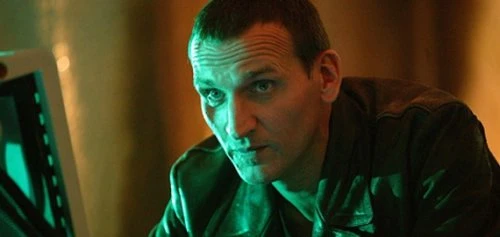
One advantage Rose had over the TV movie is that was always set to lead into a full series, and therefore could focus on an individual story and setting while still preparing the viewer for travels in time and space. Cannily, a sneak peak of the next episode was trailed before the closing credits; an old-fashioned technique, but one that more than paid off when the huge audience of Rose returned the following week.
David Tennant: The Christmas Invasion (Christmas 2005)
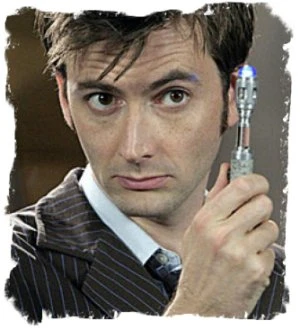
Eccleston and Piper's excellent performances and Davies's work as showrunner made the first series of the revived Doctor Who an enormous success. However, Eccleston declined to return for a second series, which was leaked to the press only days after the first episode's broadcast. Four days after broadcast, the BBC confirmed both that a second series would be recorded and that the role would be recast. There was only ever one name seriously attached to the next Doctor: David Tennant, who had made waves when he starred in Davies's production Casanova earlier that year. It was later announced that the new Doctor was to be introduced in Doctor Who 's first Christmas special, although after his first brief appearance at the end of series one, he and Rose appeared in a short scene for the 2005 edition of Children in Need, bridging the series and the special.
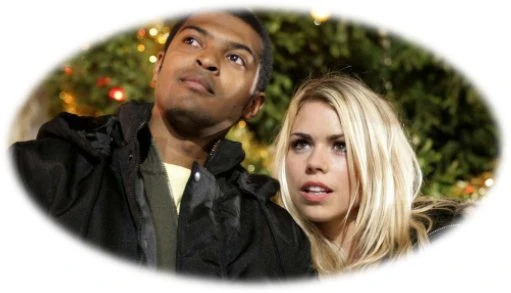
The Christmas Invasion begins much like Rose, with the Earth in space before zooming into the Tyler's home, although this time as Jackie prepares the Christmas tree. Mickey, meanwhile, is working in a garage, before they both hear the sound of the TARDIS materialising, rushing out to see it crash land. Out of this tumbles the Tenth Doctor, still in his predecessor's leather jacket and casual togs. Davies takes a leaf from Spearhead from Space again and has the Doctor out cold for a long stretch of the episode, suffering from post-regenerative sickness. Meanwhile, Rose has to deal with her friend's apparent death and replacement by a new man, alongside a new rising threat. Introducing a new Doctor so soon was again a huge risk. Young viewers who had come to the series fresh would be unprepared for the sudden change in lead actor. Those used to the idea acknowledged that Eccleston's performance had been a major factor in the new series' success. The approach taken by Davies made sense: build up the new Doctor, then hold him back, side-lining him for the bulk of the adventure. Like Rose, this is the companion's story, but this time we're reeling from the loss of the Doctor like she is. By the time the Doctor appears, decked out in a dressing gown and pyjamas (“Very Arthur Dent,” as he says), we're desperate to see him.
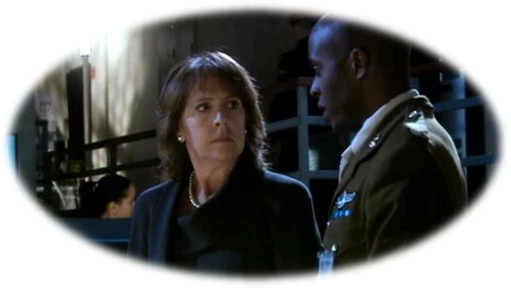
The build-up is effective, with Piper, Coduri and Clarke carrying much of the story well, while in parallel, Penelope Wilton (a big name star who appeared on Doctor Who earlier in the year) leads the official response to the alien invasion as the Prime Minister. Splitting the story between the domestic, man-on-the-street side and the government and military response, but both with familiar characters, works brilliantly. Plus, the episode gets a lot of goodwill purely from the fact it's Christmas Day and it's decked to the halls with Chritmas spirit, from presents to robot Santas to a killer Christmas tree.
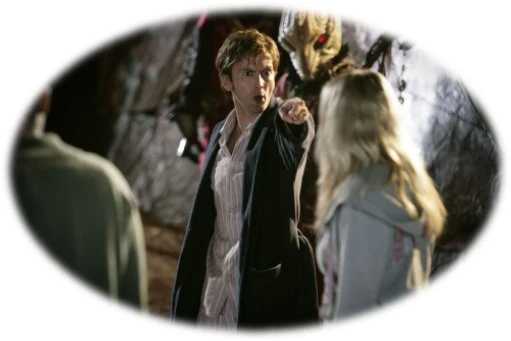
Nonetheless, when Tennant finally arrives properly, he takes complete ownership. An avowed fan of the original series, his Doctor is nonetheless a modernised version, but with the charm and coolness dialled up a notch over Eccleston's. Fully aware of his youth and sex appeal, he grins his way through the proceedings, cutting the alien Sycorax down to size by steadfastly refusing to take them seriously, before gritting his teeth for an action-packed battle to the death. It's a cinematic conclusion, with this new, happy-go-lucky Doctor unafraid to show a darker side, one that will come out more as the character develops. Finally, we get the long-missed TARDIS wardrobe scene, where the Doctor picks out a flash new outfit, backed by a specially written song. Everything about The Christmas Invasion says, “event.” Once it's over, the series belongs to David Tennant.
Matt Smith: The Eleventh Hour (April 2010)
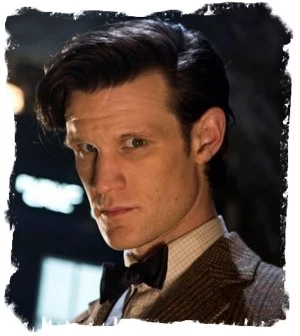
It was a touch over four years later that Tennant made his farewell appearance as the Doctor, having become perhaps the most popular incarnation of the character ever, even challenging Tom Baker's legendary reign. Having been introduced in a Christmas special, he bowed out in a two-part Christmas/New Years extravaganza. Christmastime would prove to be the most dangerous of holidays for the Doctor, with both of the next two Doctors leaving in Christmas specials. The End of Time was also the last Doctor Who written and overseen by Russell T. Davies, and he wrung every bit of emotion from it, with the Tenth Doctor making it very clear he was marching to his doom.
Quite a challenging situation for the new showrunner, Steven Moffat, to take on. Acclaimed as one of the best writers of the revived series, he inherited a series which underwent an almost complete change of cast and crew. It was as big as shift for the series as had ever been experienced in the twentieth century, and the BBC seriously considered just cancelling it altogether. So Moffat went for it, casting Matt Smith, a virtual unknown, in the role of the Doctor. At twenty-six when filming began, Smith remains the youngest actor to lead the series, a controversial choice from the start.
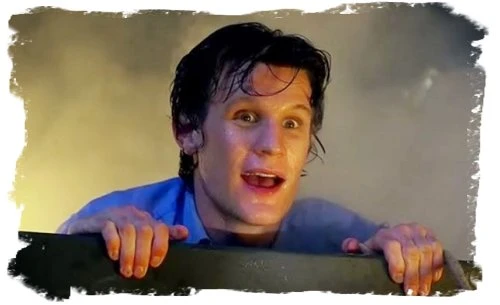
For all this, the fifth series opens with complete confidence. Even the title, The Eleventh Hour, embraces the fact that this is just the latest, eleventh iteration of the Doctor. Once again beginning over the Earth, all similarity to the previous openers is gone, as we join the Eleventh Doctor hanging desperately from his free-falling TARDIS. We then shift to young Amelia Pond, a little girl living in, essentially, a haunted house, just before a blue box crash lands in her garden and a lunatic climbs out. It's an exhilarating introduction, and it doesn't let up. The Doctor's first moments with Amelia are captivating, childishly silly. He throws out food until he settles on fish fingers and custard (how many dinnertimes were ruined, I wonder). He's daft, over-the-top, completely charming, and while it's very much children's TV, it isn't lazy or cheap in the way such programming is so often made or perceived.
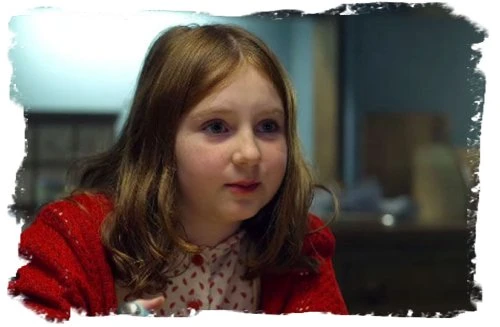
Of course, the one thing kids like more than being made to laugh is being frightened, and so the ominous crack in Amelia's wall is investigated. We hear about an escaped convict, Prisoner Zero, from a gigantic eyeball looking through from some other dimension. Just as it looks like the plot is about to get going, the Doctor has to shift his ailing TARDIS, promising to be back in five minutes. He arrives twelve years late. It's a clever use of the time travel that's central to the show, something that had already become a staple of Moffat's scripts. With a background in farcical sitcoms, Moffat excels in plotting complex scripts with witty dialogue. The stunning woman posing as a police officer and holding the Doctor under arrest is gradually revealed to be Amelia – now Amy – in a sublime piece of writing and acting. Karen Gillan is utterly brilliant (as is her cousin Caitlyn Blackwood, who plays the younger Amelia), and would dominate any scene she wasn't sharing with Smith. Yet Smith manages to both be understated and overblown by turns, childlike and fuddy-duddy. Perhaps aware of the inevitable comparisons to Tennant, he delivers several lines (and indeed, lifted dialogue) with Tennant's put-on Mockney pronunciation, before correcting himself. It's a very clever way of suggesting that this is both the same man and a distinct character. Much of the praise has to go to director Adam Smith as well, who also gives the Doctor an ingenious slow-motion mental replay power, something rarely alluded to again in the series but utilised by Moffat in his next series, Sherlock.
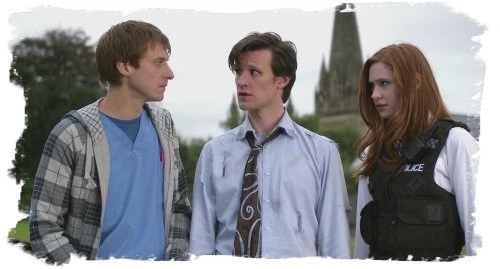
Praise is also due for Arthur Darvill, given the unforgiving task of acting as third wheel to the two leads as Rory, Amy's long-suffering boyfriend. That his mild-mannered character manages to stand out when next to them is testament to his skill and likeability. Also worth a mention is Olivia Coleman, who would go on to become a very big deal not long after this and win numerous awards, including the Oscar for Best Actress for 2018's The Favourite. She appears here in a small but important role as one of the forms of Prisoner Zero, when it isn't a giant eel.
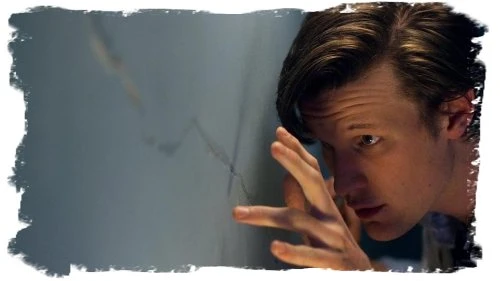
The Eleventh Hour belts through its runtime, pitting the newly regenerated and still recovering Doctor against a threat to the world and only twenty minutes to solve it. The TARDIS and the sonic screwdriver are both written out, removing the two lifelines that had arguably been too useful in previous series, and leaving him to defeat the alien threat with brainpower and wit. By the time the Doctor defeats the aliens – then orders them back to Earth for a telling off – he's secured his place as the new hero of the show, more than capable of matching Tennant. Having spent the episode running around in the remains of his predecessor's costume, he picks put his new tweed-and-bowtie ensemble (once again stolen from a hospital). A montage of the previous Doctors plays, but by the time it finishes and he straightens his bowtie, there's no need for it. He's the Doctor.
The Eleventh Hour is perhaps the best opening episode for a Doctor in the series' history, rivalling even An Unearthly Child, and the series' future was now very much assured.
Peter Capaldi: Deep Breath (August 2014)
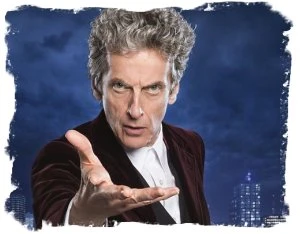
Matt Smith left Doctor Who in rude health, having taken seen it reach its greatest success in the United States and led the show through its fiftieth anniversary celebrations. After Davies's approach of slowly introducing elements from the series' past and more science-fictional ideas so as not to alienate the new audience, Moffat picked up the pace, developing more fantastical ideas and more complex storytelling, while also building the series' mythology with both new and revived characters and concepts. When Smith bowed out at the end of the 2013 Christmas special, he left a series that had enjoyed perhaps one of its most successful years ever. Deep Breath, soaring on this popularity, even had a cinematic release simultaneously with the TV broadcast.
Like Davies, Moffat found himself having to cast his second series lead and his third Doctor (including John Hurt as the missing incarnation introduced for the fiftieth anniversary special The Day of the Doctor). Having played with the idea of the Doctor subconsciously choosing younger and younger bodies as a reaction against their older/younger self's actions in the terrible Time War, the stage was set to go back to basics with an older man in the role. Peter Capaldi's casting was announced even before the anniversary celebrations began, allowing him a sneaky cameo in The Day of the Doctor before his introductory moments in the following Christmas special.
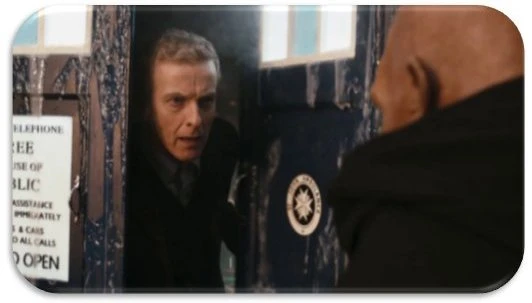
Capaldi, a respected, BAFTA award-winning actor and director, and long-time fan of the programme, was already a familiar face on television. In his youth he had been known for romantic and comedic roles, although his work included a range of material. By 2013, however, he was most famous for playing the infamously foul-mouthed Malcolm Tucker in the political sitcom The Thick of It and its cinematic sequel In the Loop, and was currently filming The Musketeers as the villainous Cardinal Richelieu. He had previously appeared in both Doctor Who and its spin-off Torchwood, and amusingly, one of his last credits before his casting as the lead in Doctor Who was in World War Z as “WHO doctor.”
This ferocious-looking, middle-aged Scotsman, best known by contemporary audiences as a sweary civil servant, was a world away from the outwardly young and romantic leads of the previous six series of Doctor Who. Wisely, Moffat chose to embrace this. The Doctor's companion Clara, the enchanting and engaging Jenna Coleman, had become a very important figure to the series and the Doctor himself, even meeting his previous selves and seeing the Eleventh Doctor reach old age. Each time, though, her fresh-faced Doctor returned to her, if even briefly. Clara is completely wrong-footed by the Doctor's transformation. Even Rose, Sarah Jane, and Ben and Polly, had been presented with a different situation, with a Doctor who became younger. Clara is faced with her friend and possible romantic interest suddenly appearing far older and less approachable than she's used to, with no chance of her Doctor coming back.
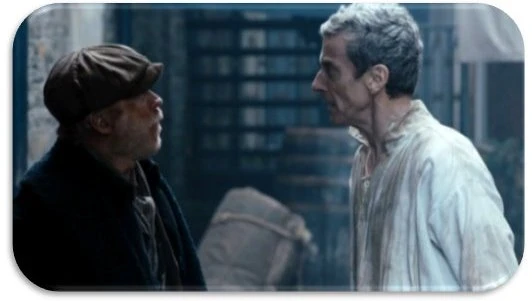
In many ways, the Twelfth Doctor is the Sixth Doctor done right from the start. Colin Baker (who had also appeared in the series before his casting as the lead) was given a version of the Doctor who was unlikeable and hard to handle. Capaldi's Doctor is also aggressive, dangerous, difficult to like and hard to relate to, but presented with more charisma and more thoughtful writing. We can see how difficult it is for Clara, but also how difficult it is for the Doctor. With an established companion, Moffat gives the Doctor a bout of post-regenerative difficulty, allowing focus on Clara's reactions; the same approach Davies used for Tennant's introduction, and the opposite of Moffat's previous new Doctor story, which started with a clean slate. During the course of the episode, we do explore the Doctor's reaction, including his enthusiastic discovery that he's Scottish, but also his clear loneliness and uncertainty about his latest change. Entertainingly, this time the Doctor spends time in various different outfits, changing from his predecessor's clothes to a Victorian nightgown, to a shabby overcoat bought off a tramp, to a stolen Victorian suit, which could easily have stuck as his outfit, before he finally appears at the end in his new, modern-retro clothing.
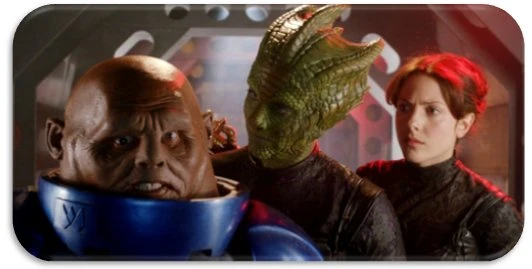
Moffat also eases the transition for the viewers by bringing back established secondary characters, as had been successful several times in the past. However, the use of the so-called Paternoster Gang – a group of otherworldly investigators in Victorian London – shows how the focus of the series has shifted away from the recognisable to the fantastic. Madame Vastra (Neve McIntosh) is a Silurian (a species introduced in 1970 and revamped in 2010), while Strax (Dan Starkey) is a Sontaran (introduced in 1973 and revived for 2008). Only Jenny (Catrin Stewart) is human, and she's essentially a ninja who pretends to be a maid. It shows a series that has clearly become embroiled in its own history again. Even the threat of the episode, clockwork robots led by the sinister half-faced man (a chilling Peter Ferdinando) are resurrected from Moffat's own script for David Tennant, 2006's The Girl in the Fireplace. (Interestingly, however, while this is familiar to long-term viewers, for the Doctor, so much time has passed he can no longer clearly remember the events.) It indicates a programme that is becoming rather set in its ways. However, it still has the capacity to surprise and do interesting things. There's a powerful moment when the Doctor confronts the cobbled-together cyborg and points out the ancient ghoul probably can't even remember where he got his face, before catching a reflection of his own re-used image, clearly asking himself the same question.
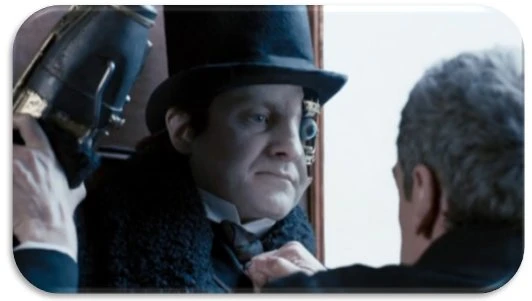
Unusually, the eras of the Eleventh and Twelfth Doctors overlap. Not only did Capaldi have a pre-regeneration cameo, but Smith appears in this episode, telephoning Clara from just before his regeneration to ask her to help his future self. The new Doctor asks her if she will. “You shouldn't have been listening,” she says. “I wasn't,” he replies. “That was me on the phone.” It's a beautiful moment that clicks everything into place, as Clara finally sees the grumpy new Doctor as the same man she was travelling with.
As with The Eleventh Hour , there's plenty of focus on the future as well. In both instances, Moffat drops new elements into the story that hint at a new story arc that runs right through their respective Doctors' tenures. In Deep Breath, the episode ends with a cameo by a mysterious new villain, and the audience is left questioning.
Jodie Whittaker: The Woman Who Fell to Earth (October 2018)
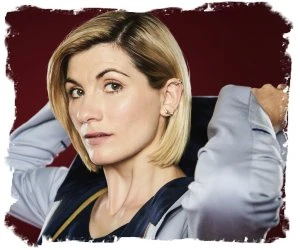
In 2017, it was all change again, with both Moffat and Capaldi announcing they would be stepping down after the tenth series. In the end, they both stayed on for one further episode, that year's Christmas special, due to the commitments of the incoming showrunner, Chris Chibnall. Chibnall had, like Moffat, worked on Doctor Who previously, providing scripts during both Tennant's and Smith's runs, and had been the showrunner on the first two series of Torchwood. However, his biggest success was the crime drama Broadchurch. This had starred former Doctor Who actors including Tennant and Arthur Darvill, but there was a suspicion that Chibnall would cast someone he had worked closely with on the series as the new Doctor. These rumours turned out to be true. The Thirteenth Doctor was revealed as Jodie Whittaker, an award-winning actress who had some science fiction pedigree with Attack the Block and Black Mirror, but was better known for straight drama and comedy-drama.
The announcement that the Doctor was to be a woman was predictably controversial, although Moffat had already laid the groundwork by introducing Michelle Gomez as Missy, a new incarnation of the Master, who plagued the Twelfth Doctor through his tenure. Much like when Moffat had taken over, Chibnall had a difficult of leading an entirely new production team into a distinctly new era for the programme. Even Murray Gold, who had provided the music for the series since 2005, left at the end of the Moffat leadership, replaced by the up-and-coming Segun Akinola.
In many ways, the situation was very similar to the changeover from Davies and Tennant to Moffat and Smith. Both involved a huge change in both cast and crew, and signified this with considerable stylistic changes. A sort of tradition appears to be developing, whereby the outgoing showrunner wrecks the TARDIS so that the new one can have it regenerate, and unveil the redesign after withholding it for some time (we don't see the new TARDIS interior until the end of Smith's first episode, and Whittaker's TARDIS isn't revealed until the end of her second episode). Both introduce a new and distinct arrangement of the theme tune and a new title sequence (again, held back for Whittaker's début in favour of a cold open). Both outgoing showrunners let their successors write their new Doctor's first words, and both Doctors began their new season crashing to the Earth.
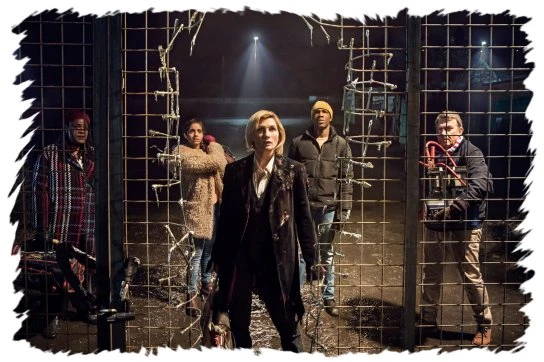
The Thirteenth Doctor landed in Sheffield, crashing through the roof of a train. Her appearance was also kept back for some time, with the first act focusing on the new supporting cast. Tosin Cole is introduced as Ryan Sinclair, a young man learning to deal with his dyspraxia, in a return to a more reality-based background for the series. We also meet his grandmother Grace (Sharon Clarke) and her husband Graham (Bradley Walsh), and probationary police officer Yasmin Khan (Mandip Gill), who happened to be at school with Ryan. There's a very down-to-earth, distinctly northern feel to the episode, which is shot with a darker, grittier palette than the series has generally used. This contrasts with some remarkable alien designs, from a brightly coloured pod to a writhing entity comprised of tentacles, and the Predator-like villain, a particularly gruesome creation with a face full of teeth. The more horror-influenced edge of the production is softened by plenty of humour, including the fact that the alien villain's name sounds just like “Tim Shaw.”
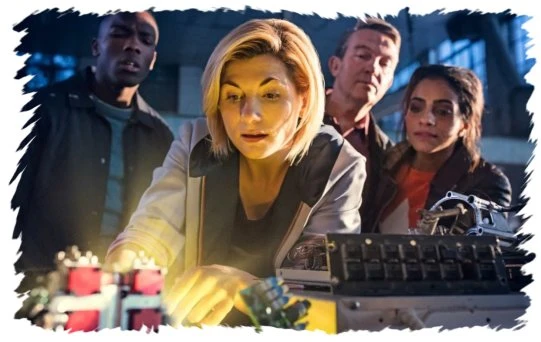
Into this crashes the new Doctor, and rather like Smith's début, Whittaker's first story sees her Doctor thrown into an adventure with minimal resources while she's still regenerating. She gives a breathless but engaging performance that sells her new Doctor, and surprisingly little is made of her change in gender. Like Smith, she remains in the ragged remains of her predecessor's costume for most of the adventure, only changing at the insistence of her new companions, and refreshingly, there's no TARDIS wardrobe or quick spot of theft from a hospital. This time, it's a charity shop job.
The clash of the otherworldly threats and the eccentricity of the Doctor with the industrial ordinariness of Sheffield works extremely well, and there's definitely a hint of the style of Torchwood in this episode. The series itself didn't pan out in quite the way this episode promised, but as a début, The Woman Who Fell to Earth works. The viewing figures for the episode saw a huge increase over the previous few years, so the job had clearly been done.
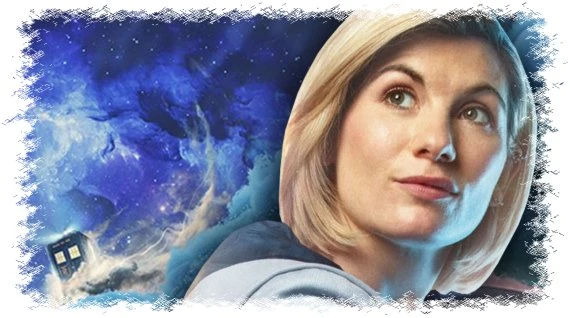
The future of Doctor Who is unknown, but the BBC has stated there are no plans to rest it. The thirteenth series (or thirty-ninth, in old money) is expected to air in 2021, with Chibnall still at the helm and Whittaker still in the lead. With unexpected Doctors being introduced in the latest few episodes, it will interesting to see just how the production will approach the next big change in the programme's long history.
Ncuti Gatwa's debut story can be found in a stand-alone article: The Church on Ruby Road.
Published on May 13th, 2020. Written by Daniel Tessier for Television Heaven.


